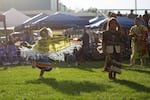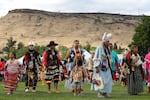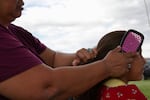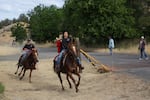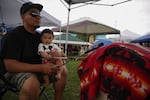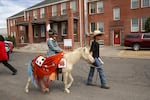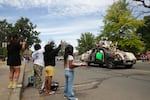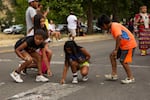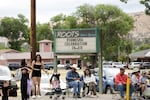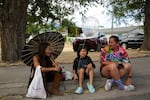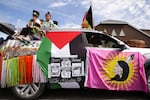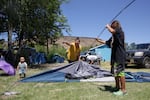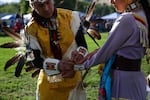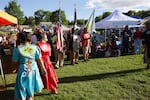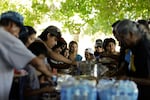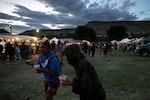
In this 2023 photo provided by the Native American Youth and Family Center, or NAYA, a pair of children dance at the annual Neerchokikoo powwow in Portland, Ore. The event was hosted by NAYA, to celebrate Native culture through dance, music, art and food.
Courtesy of the Native American Youth and Family Center
Founded in 1974, the Native American Youth and Family Center, or NAYA, was created to be a place for Native youth in Portland to safely express and foster their cultural identity. Over the last 50 years, it’s grown to provide an array of services which include free camps for youth, housing assistance for families, a food pantry, networking opportunities for Native entrepreneurs and more.
This Saturday, it will hold its annual Neerchokikoo powwow at the NAYA Family Center in Northeast Portland. The event is free and will feature Native American dancers, drum groups and a community meal featuring First Foods.
Tamara Henderson is an enrolled member of the Laguna Pueblo tribe and the chief operating officer of NAYA. She joined OPB’s “All Things Considered” host Crystal Ligori to talk about the powwow and the nonprofit’s 50th anniversary.
Crystal Ligori: For folks who don’t know, can we start with a little history of NAYA? What was the original idea behind the organization?
Tamara Henderson: So, NAYA was founded back in the seventies by parents, volunteers, elders that were really looking for a safe place for youth to come together to celebrate their cultural identity and to play some basketball. So we were really founded on basketball! As the story has been told to me by elders and others that have been with the organization for a very long time, we very quickly added tutoring as our first funded program because, of course, to play sports, you need to have your academics up. And so our first grant-funded program was tutoring and that’s still a staple of what NAYA has today.
We still have a recreation coordinator and we also still have our after-school learning center, and now we’ve grown to include a college and career center that offer after-school tutoring support, academic support and things of that nature. But that’s just a tiny slice of our history.
Ligori: I know that Portland is home to Native populations, representing members from 380 different tribes. Can you talk a little bit about that tribal diversity in the metro area?
Henderson: So we will serve folks in this organization that have representations from over 380 different tribes. I think it’s important for the audience to know that that can include people that maybe have multiple tribal identities and that are also multiracial. But folks that might identify with two, three, four, even five or more tribes, and so it can be the diversity within one’s own person … But also, we have folks from all over the country that have found a comfortable safe place in the urban Native community of Portland.
Part of the reason historically that we have a larger urban Native population here in Portland is because Portland was selected as a federal relocation city as a part of the Federal Relocation Act. And so that is how some people actually got to Portland, others came because it’s an urban Native center or just by happenstance and have found the other Natives and built a community here.
Ligori: NAYA is celebrating its 50th anniversary this year and the celebration is happening in conjunction with this weekend’s Neerchokikoo Powwow. For folks who’ve never been to a powwow, what can they expect?
Henderson: That is such a good question. I think so often people feel like they can’t come to a powwow if they don’t know what to expect and they should know they can come — that’s partly why powwows are always free and open to the public. We want to teach people about our culture and the diversity within our culture.
So they should expect food, they should expect amazing vendors from our community that will be selling their Native made crafts, and arts, and jewelry. But you’ll also, of course, have the opportunity to see young people and elders alike dancing and celebrating our culture and our traditions. And so that’s something that if folks really sit in the arena and listen to the MC, as they’re doing the announcing, you will learn a lot about why we have certain traditions or why we have certain dances and who those dances are honoring. So that can be a really great way for people to get a little introduction into the Native community.
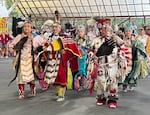
A group of dancers at last year's Neerchokikoo powwow in Portland, Ore, September 16, 2023. For 50 years, the Native American Youth and Family Center, or NAYA, has given Native youth and families a space to safely express and foster their cultural identity.
Courtesy of the Native American Youth and Family Center
Ligori: So what do you see for the next 50 years? What is the future of NAYA?
Henderson: A lot of what the future is going to come down to is: what does our community want to see? What do they want us to support? What do they see as next? A lot of our programs, our next visions, our next steps have actually come from community input. And I’ll give a quick example: Our powwow was actually born out of Culture Night, which is a staple program for us.
So, as we did Culture Night, when we first moved to this building, the community actually said to the staff, “We have to have a powwow so that our young people can go learn how to dance in a safe environment.” It’s a really important piece of our community to be responsive and to make sure that we’re meeting their needs. And so a lot of what I see us doing next is really up to what our community hears and sees. I know that we’re venturing into our very first shelter, and there may be more need for that as we grow. We’re also growing into Southwest Washington, into Clackamas, into other areas, so I see the next step in visions as moving further out to really meet the needs of our ever-diversifying community that in some cases, is moving further out of Portland. I also see educational opportunities — we are looking at offering a residence hall, bringing in more food sovereignty efforts and increasing the yield that our garden is already producing, bringing in a Native games field so that we can have more formal tournaments here outdoors, similar to what our ancestors did. And so we’re really excited to see some of those things explored and really make some improvements that increase accessibility and thereby allow us to serve even more of the most vulnerable community members that we want to serve and that we exist to serve.


